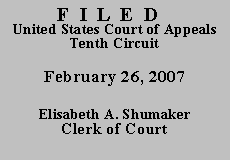

|
UNITED STATES OF AMERICA, |
|
Before TACHA, Chief Circuit Judge, MURPHY, Circuit Judge, and
LUNGSTRUM,(2)
Chief District Judge.
In his response to the order to show cause, Roblero-Mejia concedes he is only appealing the district court's conclusion that the Wyoming Highway Patrol Trooper was entitled to enforce federal immigration laws. According to Roblero-Mejia, he is only appealing that issue because that is the real reason the Wyoming Highway Patrol Trooper detained him. As the Supreme Court has made clear, however, an officer's "subjective motivation is irrelevant" to the question of whether a particular seizure was reasonable: "An action is 'reasonable' under the Fourth Amendment, regardless of the individual officer's state of mind, as long as the circumstances, viewed objectively, justify the action." Brigham City v. Stuart, 126 S. Ct. 1943, 1948 (2006) (rejecting the argument that the reasonableness of a warrantless entry into a home turns upon the officer's subjective motivation for entering) (internal quotations and brackets omitted). Thus, the particular reasons Trooper Mrzny chose to detain Roblero-Mejia are irrelevant. Instead, the question is whether, viewed objectively, an officer could have detained Roblero-Mejia for violations of Wyoming state law. Id.
The district court specifically concluded the facts, viewed objectively, demonstrated probable cause existed to detain Roblero-Mejia for violations of Wyoming state law. As Roblero-Mejia makes clear in his response to the order to show cause, he does not challenge that conclusion. Thus, even if this court were to rule in his favor on the question presented on appeal, he would not be entitled to relief because the district court's judgment is supported by an alternative, unchallenged justification. Berna, 101 F.3d at 633.
For those reasons set out above, the order of the district court denying Roblero-Mejia's motion to suppress is AFFIRMED. This matter is stricken from the oral argument calendar and counsel are excused from attendance at oral argument on Tuesday, March 6, 2007.
ENTERED FOR THE COURT
Michael R. Murphy
Circuit Judge
*. This order and judgment is not binding precedent except under the doctrines of law of the case, res judicata, and collateral estoppel. It may be cited, however, for its persuasive value consistent with Fed. R. App. P. 32.1 and 10th Cir. R. 32.1.
2.The Honorable John W. Lungstrum, Chief U.S. District Court Judge, District of Kansas, sitting by designation.
1.We further noted it could be argued that by proceeding to the merits of Roblero-Mejia's appeal, this court would be offering up an advisory opinion. That is, even if this court were to rule in favor of Roblero-Mejia on the question actually presented on appeal, it would not affect his rights because the district court's judgment is supported by an unchallenged, equally-sufficient rationale. Cf Preiser v. Newkirk, 422 U.S. 395, 401 (1975) (holding that "a federal court has neither the power to render advisory opinions nor to decide questions that cannot affect the rights of the litigants in the case before [it]" (quotation omitted)).